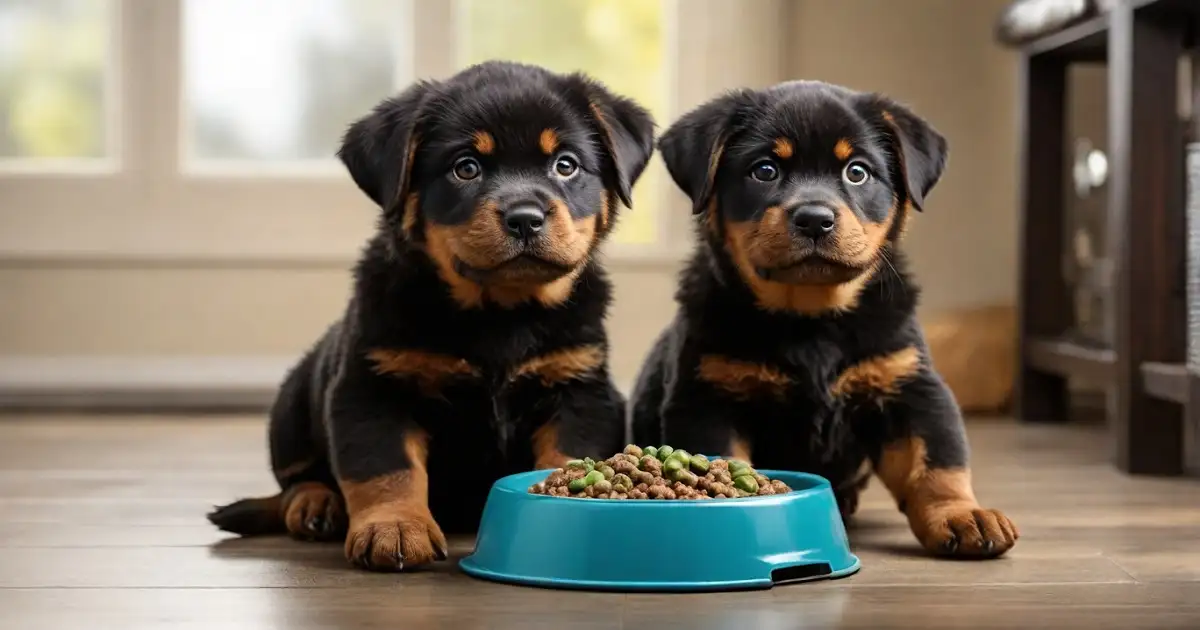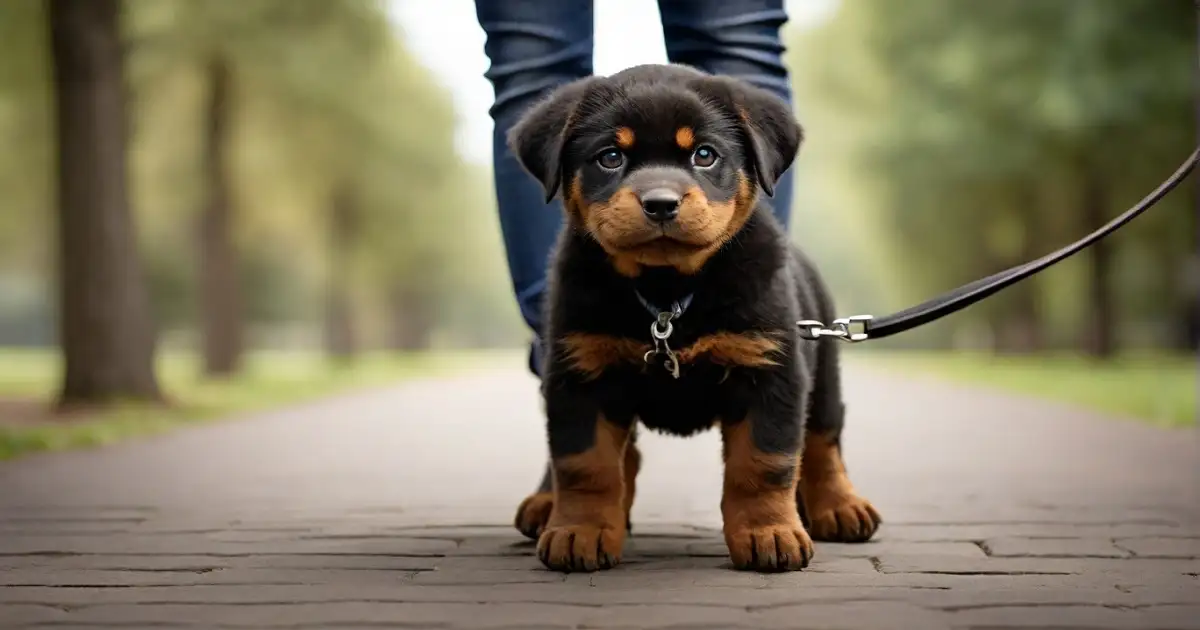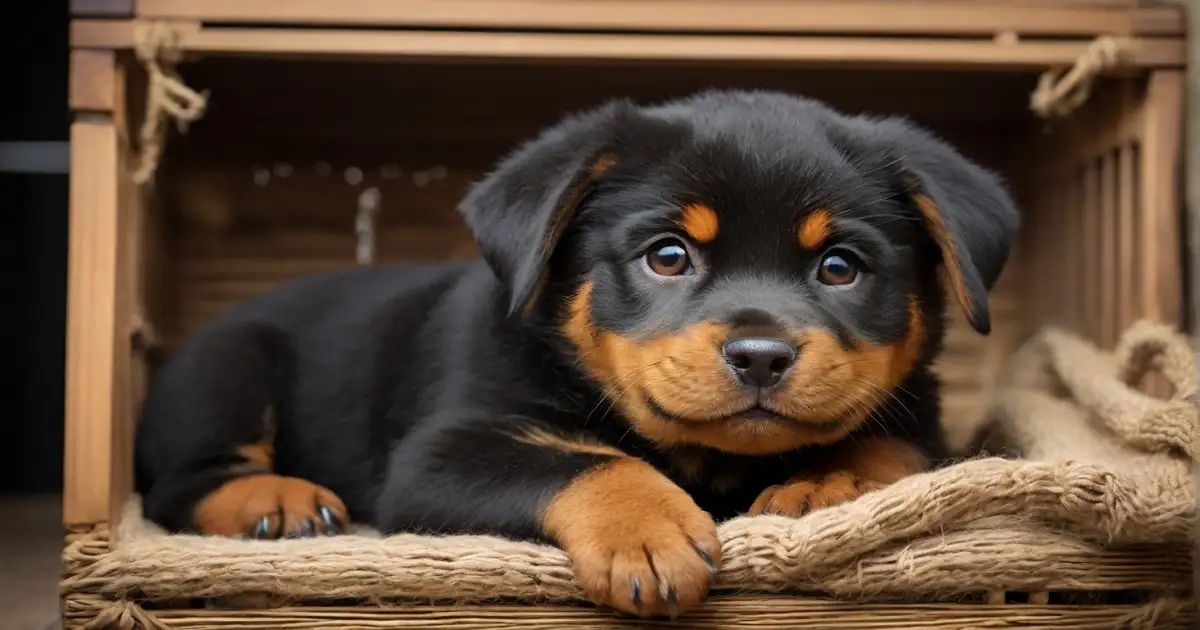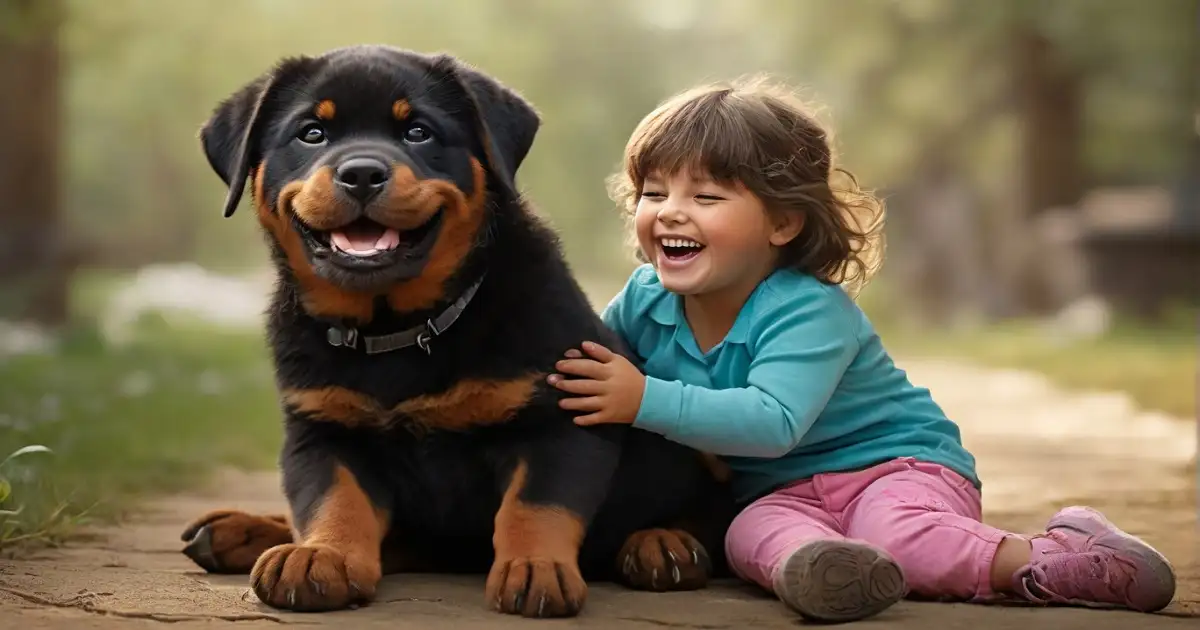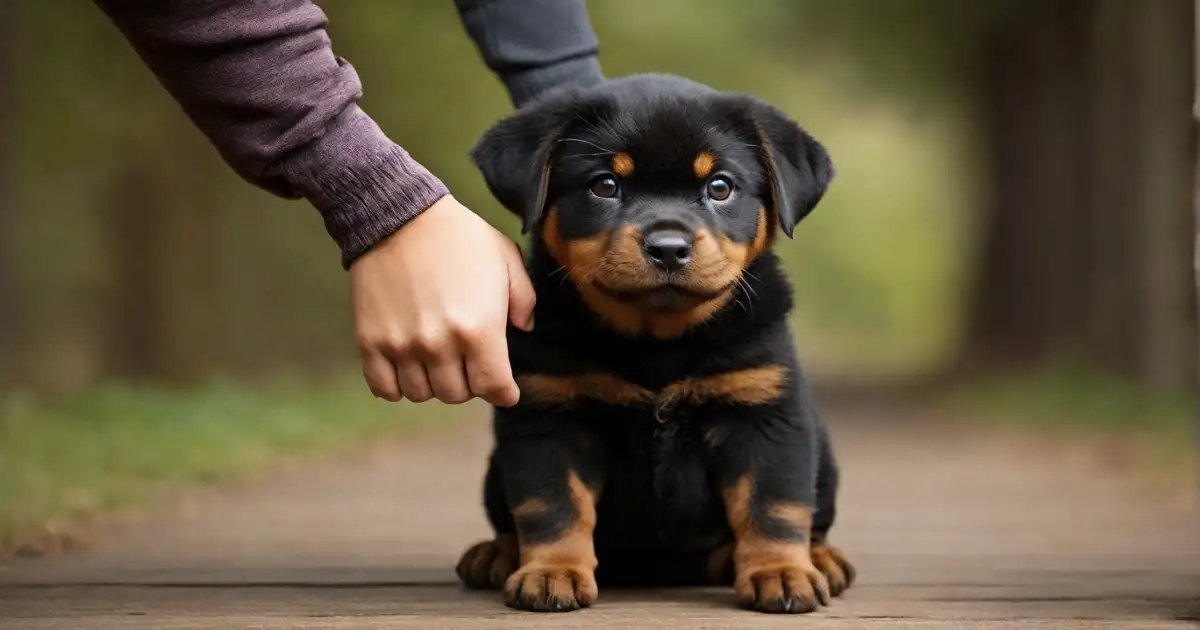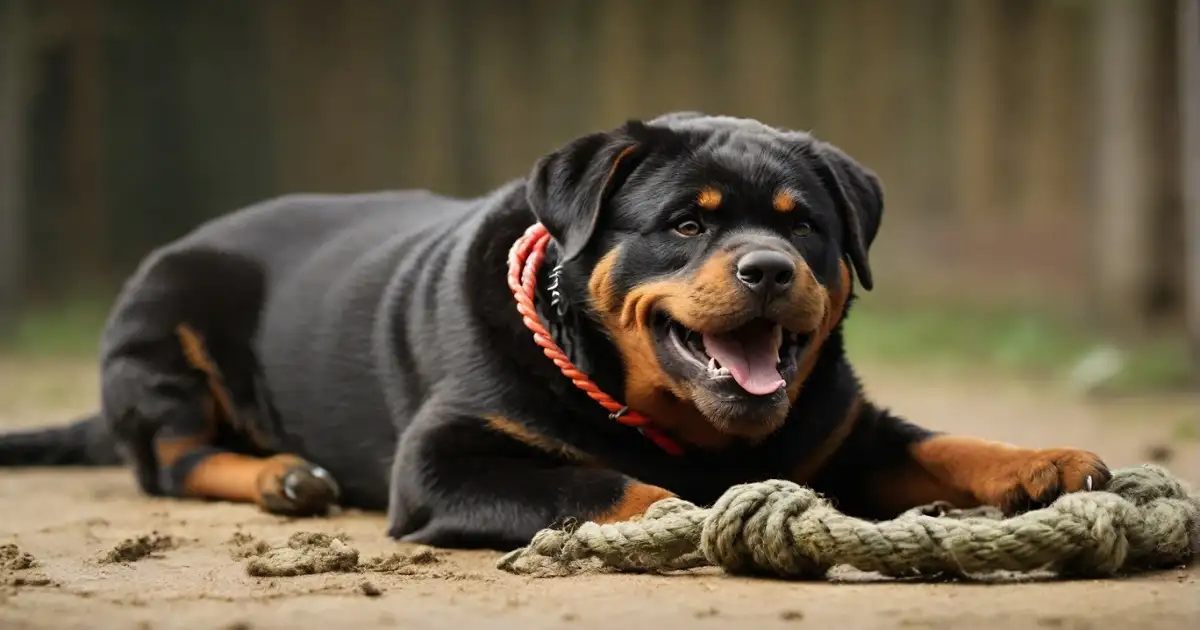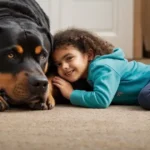Hey there, fellow Rottweiler lover! There’s nothing quite as exciting as bringing home your bouncing baby Rottie pup. I’ll never forget the day we first met our rambunctious Roscoe.
While those early days with your energetic 1-month-old Rottweiler puppy are magical, they also present some unique training and socialization challenges.
Don’t worry! In this comprehensive guide, I’ll provide you with my top insider tips to ensure your adorable 1-month-old Rottweiler grows into a well-mannered, socialized member of the family.
We’ll cover everything from potty training to bite inhibition to exercise and nutrition recommendations. Let’s dive in!
Gearing Up: Essential Supplies for Your 1-Month-Old Rottweiler
Bringing home your 1-month-old Rottweiler puppy is so exciting! But before you pick up your pup, you’ll want to make sure you have all the essential supplies on hand to set them up for success during these crucial early weeks. Having the right gear will make potty training, crate training, and basic obedience much easier.
Collar and Leash
A lightweight collar and leash designed specifically for puppies will help keep your wiggly Rottweiler safe on walks and during outdoor potty breaks. Look for a flat buckle collar made of nylon or leather, and size it so you can comfortably fit two fingers between the collar and your pup’s neck. For the leash, a 4-6 foot option gives you good control.
ID Tag
An ID tag imprinted with your name, phone number, and address provides an extra layer of protection in case your 1-month-old Rottweiler ever manages to slip out. Attach it securely to their collar.
Crate
A properly sized crate is essential for confining and potty training your Rottie pup. Look for one big enough for them to stand up, turn around, and lie down comfortably. Consider an adjustable crate that grows along with your puppy.
Puppy Food and Treats
High-quality puppy food designed for large breeds like the Rottweiler ensures your pup gets proper nutrition during this vital growth period. Treats are also key for rewards-based training. Look for soft, bite-sized treats your puppy can nibble easily.
Food and Water Bowls
Stainless steel bowls are durable, easy to clean, and won’t harbor as much bacteria as plastic. Pick heavy, non-tip bowls until your puppy stops dragging them everywhere!
Potty Training Pads
These absorbent pads give your pup an indoor potty option, especially helpful during the early weeks of training your 1-month-old Rottweiler. Look for pads with attractant spray to encourage pottying in the right spot.
Puppy Playpen
A playpen provides a safe, confined space for your energetic Rottweiler pup to play, nap, and hang out while you’re busy. It also prevents chewing mishaps around the house during the teething phase.
Interactive Toys
Mentally stimulating toys like puzzle toys, chew ropes, and Kongs stuffed with treats will keep your brilliant 1-month-old Rottweiler pup happily occupied when they can’t have your undivided attention.
Enzyme Cleaner
Accidents happen during potty training! An enzyme cleaner designed for pet messes will eliminate odors and prevent your puppy from being drawn back to the same soiled spots.
Brush and Nail Clippers
Start getting your Rottweiler used to being brushed and having their nails clipped from a young age. This facilitates easy grooming as they grow.
Preparing your home with this essential gear will get your 1-month-old Rottweiler off to a great start! Let me know if you need any specific product recommendations. Next, we’ll dive into effective potty training methods.
Potty Training Your 1-Month-Old Rottweiler Puppy
Potty training is one of the biggest priorities with your 1-month-old Rottweiler puppy. While it requires diligence and patience, having a solid potty training plan will help your energetic Rottie learn good habits right from the start. Here are my proven tips for potty training success!
Establish a Routine
Puppies do best with a consistent schedule. Take your 1-month-old Rottweiler outside to potty at regular intervals – first thing in the morning, after naps and meals, and every 30-60 minutes in between. Keeping an eye on the clock prevents accidents.
Recognize Potty Signals
Learn your puppy’s signals that they need to go potty. Common cues include restlessness, circling, sniffing, and heading to the door. When you see these, immediately take them outside.
Use a Crate
When you can’t actively supervise your Rottweiler puppy, placing them in their crate prevents indoor accidents. Just make sure to take them out as soon as the crate door opens. Crates teach pups to “hold it.”
Choose a Potty Spot
Take your pup to the same outdoor spot each time and use a command like “Go potty.” This trains them to associate that area and command with going to the bathroom.
Reward Success
Always praise and give treats when your 1-month old Rottweiler successfully potties outdoors. This positive reinforcement motivates them to keep going in the right place.
Manage Accidents
If your energetic Rottie does have an accident, stay calm and immediately take them outside to finish. Scolding teaches nothing but fear. Just focus on rewarding their successes.
Use Potty Pads
Indoor potty pads are useful backups, especially for young pups. Place pads by the door for easy outdoor transitioning later on.
Watch for Signals at Night
Nighttime potty training is tricky but look for restless behavior 30-60 minutes after the before-bed trip. Take them out right away before an accident happens.
Stick to the Schedule
Consistency and routine are key! Set alarms if needed to remind you to take your 1-month-old Rottweiler out on schedule, without fail. Frequent potty breaks build habits.
With these potty training tips, your intelligent Rottweiler pup will get the hang of it in no time. Just stay patient and positive! Let me know if you have any other potty training questions.
Crate Training Your 1-Month-Old Rottweiler
Crate training offers many benefits for your 1-month-old Rottweiler puppy. When introduced positively, crates help with potty training, provide a cozy den-like sanctuary, and prevent destructive chewing behaviors. Here’s how to crate train your Rottie pup successfully:
Select the Right Size Crate
Choose a crate just large enough for your Rottweiler to stand up, lie down, and turn around. If it’s too big, they may soil one side and sleep on the other. Get an adjustable crate that expands as your pup grows.
Make It Comfortable
Add a soft crate mat or bedding and some safe chew toys to occupy your puppy when inside. Keeping them comfortable makes the crate more inviting.
Use Treats and Praise
When first introducing the crate, toss treats and toys inside so your 1-month-old Rottweiler happily enters. Provide praise and treats whenever they go in voluntarily. This builds a positive association.
Start Slowly
During initial training, only keep your pup crated for short periods while you’re home to avoid stress. Slowly increase crate time from 10 minutes to a few hours as they adjust.
Establish a Routine
Get your Rottweiler used to a consistent crating schedule, especially around mealtimes and bedtime. Routine signals that the crate means rest or alone time.
Make It Positive
Never use the crate as punishment. Only place your resistant pup inside after praising them, giving a treat or toy, and using a command like “kennel.”
Provide Potty Breaks
Don’t keep puppies crated for more than 2-3 hours, as they can’t “hold it” that long. Take your 1-month-old Rottweiler straight outside to potty after crating.
Ignore Protests
Your pup may whine or bark when first crated during training. As long as their needs are met, you can ignore mild protests so they don’t learn to demand your attention.
Use Crates Strategically
When you can’t supervise your energetic Rottweiler, use crates to prevent household destruction and accidents. Pups won’t soil their sleeping space.
Never Use As Punishment
Only associate crates with positive experiences. Your 1-month-old Rottweiler should see it as their special den, not a prison!
With persistence and positivity, your Rottie pup will come to love their crate. Let me know if you have any other crate training questions!
Teaching Bite Inhibition to Your 1-Month-Old Rottweiler
Those sharp little puppy teeth are so cute until your 1-month-old Rottweiler decides your hands and ankles look tasty! While mouthing and biting are normal puppy behaviors, it’s essential to teach them polite mouth habits and bite inhibition from an early age. Here are effective techniques:
Redirect with Chew Toys
When your Rottweiler pup starts nibbling fingers or clothes, quickly redirect their mouth to an appropriate chew toy instead. This teaches what’s acceptable to bite.
Use Reverse Time-Outs
If redirecting doesn’t work, give a firm “No bite!” and then leave the room briefly. This teaches that biting ends all fun. Praise them when you return if they’re calm.
Avoid Wrestling Games
Wrestling or “play fighting” with your hands teaches your 1-month-old Rottweiler that human skin is a toy. Use toys only when playing tug or fetch.
Yelp Like a Puppy
When bitten, give a high-pitched “Ouch!” that mimics a hurt puppy’s yelp. This signals “too hard” in their language. Praise gentle mouthing.
Withdraw Attention
If your pup gets overly bitey or rough during play, immediately stand up and ignore them for 30-60 seconds. Teach them calmer behavior earns your engagement.
Practice Handling
Gently handle your Rottweiler’s paws, ears, tail, and mouth frequently. This desensitizes them to being touched to avoid defensive nipping. Pair with treats!
Avoid Physical Punishment
Never physically punish puppy-biting behavior. This can make biting worse and damage your bond. Use positive reinforcement only.
Be Consistent
Make sure all family members use the same bite inhibition techniques with your 1-month-old Rottweiler. Consistency is key.
Get Veterinary Advice
If biting remains an issue after diligently using these methods, speak to your vet or trainer. Aggressive puppy biting could indicate a health problem.
Be Patient
Bite inhibition takes time and consistency, especially with mouthy breeds like the Rottweiler. But the diligent effort is well worth it for everyone’s safety!
With prompt and consistent training, you can redirect your 1-month-old Rottweiler’s sharp teeth onto appropriate chew toys instead of human limbs! Let me know if you need any other tips for curbing puppy biting.
Basic Obedience Training for Your 1-Month-Old Rottweiler
Even at just 1 month old, your intelligent Rottweiler puppy is ready to begin basic obedience training. Starting early allows you to positively shape their behavior and prevent problem behaviors before they start. Focus first on these fundamental commands:
Sit
“Sit” is often the very first cue taught. Hold a treat above your puppy’s nose, slowly moving it back behind their head until they sit, then reward. Or gently push their hindquarters down into a sit position, praising as you do so.
Down
Once “sit” is mastered, teach “down” by holding the lure treat in front of your Rottweiler’s nose, slowly moving it straight down to the floor. Their nose will follow until they lie down. Reward!
Stay
After your pup sits or lies down, say “stay,” take a step back, then return and reward. Gradually increase the distance and duration of stays through consistent training.
Come
Call your 1-month-old Rottweiler puppy to come with an excited, happy tone. Immediately reward them with treats when they reach you. Switch up your body position and distance as you practice.
Watch Me
Hold a treat at your pup’s eye level and move it up toward your face as you say, “Watch me.” When they make eye contact, reward! This builds attention.
Loose Leash Walking
Start leash training early by rewarding your Rottweiler for staying at your side as you walk. Change direction frequently and use treats to keep focus on you, not pulling ahead.
Name Recognition
Say your puppy’s name happily, then immediately treat when they look at you. This teaches them their name means to pay attention, and a reward is coming!
Positive Reinforcement
Always use reward-based methods, never punishment, when training your 1-month-old Rottweiler. This motivates them to want to learn and build a trusting bond.
Short, Frequent Sessions
Puppies have short attention spans, so keep training sessions very short (5 minutes or less) but frequent. End on successes to keep it positive and fun!
Be Patient and Consistent
Training takes regular practice and infinite patience, especially with an energetic breed like the Rottweiler! But you’ll reap the rewards for years to come.
Starting basic obedience early and keeping it fun and reward-based will give you the best chance of ending up with a well-trained 1-month-old Rottweiler. Let me know if you need any clarification on these puppy training tips!
Proper Socialization for Your 1-Month-Old Rottweiler
Socialization is a crucial part of raising a happy, well-adjusted 1-month-old Rottweiler puppy. Exposing your Rottie to new sights, sounds, people, animals, and experiences during this formative stage sets them up for confidence and proper manners later in life. Here are some effective socialization tips:
Introduce New People
Invite friends over regularly so your Rottweiler puppy meets people of all ages, appearances, and backgrounds. Let them pet and offer treats to help your pup associate new people with good things.
Arrange Puppy Play Dates
Set up supervised play sessions with friends and vaccinated, gentle dogs so your 1-Month-Old Rottweiler learns how to interact appropriately with other canines. Start slow and watch closely.
Explore New Environments
Bring your puppy to busy parks, stores that allow dogs, markets, and other public settings. Pair with treats and praise so they gain confidence in new environments.
Expose to Sounds
Play recordings of loud noises like fireworks, thunderstorms, engines, and crowds to desensitize your Rottweiler pup. Associate with rewards.
Introduce Handling
Touch your pup’s paws, ears, tail, etc. frequently. Examine their mouth and teeth gently, too. This prevents defensiveness about being handled later during grooming and vet visits.
Use Positive Reinforcement
Always pair socialization experiences with praise and treats so your 1-Month-Old Rottweiler associates new things with positivity. Correct fear responses patiently and gently.
Let Them Set the Pace
Don’t overwhelm your puppy. Go slow, watch their comfort level, and don’t force interactions. Socialization should be positive!
Prioritize Early Weeks
The first 16 weeks are the most important socialization period for Rottweiler puppies. Ensure plenty of diverse, positive exposures during this time.
Keep Trying New Things
Socialization is ongoing. Continue exposing your Rottweiler to novel situations well beyond puppyhood to maintain their confidence.
With proper early socialization, your Rottie will grow into a calm, friendly dog that is comfortable in any situation. Let me know if you need any other tips for raising a well-socialized pup!
Exercising and Stimulating Your 1-Month-Old Rottweiler Puppy
Rottweiler puppies have lots of energy and intelligence to burn! Providing adequate physical and mental exercise will prevent problem behaviors like destructive chewing, hyperactivity, and nipping in your energetic 1-month-old Rottweiler. Here are some great ways to stimulate your pup:
Take Short Walks
Brief 10-15 minute walks on a leash or in your yard are sufficient for a young Rottie puppy. This gives them time to sniff, explore, and expend energy. Just don’t overdo walks while their joints are still developing.
Create a Puppy Playpen
Fill an enclosed playpen or puppy-proofed room with fun toys to keep your 1-month-old Rottweiler happily occupied when you can’t directly supervise their play. Rotate toys to keep it interesting.
Play Interactive Games
Engage your puppy’s mind and body with games like hide-and-seek with toys and treats, “find it,” using their nose to search for hidden kibble, and fetch.
Provide Chew Toys
Offer an abundance of safe, durable chew toys to satisfy your Rottweiler’s need to nibble and relieve teething discomfort. Supervise to prevent swallowing chunks.
Try Puppy Puzzles
Introduce interactive puzzle toys where your pup must move and slide pieces to reveal kibble inside. These provide mental stimulation.
Socialize with Other Puppies
When possible, let your 1-month-old Rottweiler play off-leash with age-matched, vaccinated puppy friends. This allows active, social play. Monitor closely.
Practice Training Commands
Use short training sessions throughout the day to engage your intelligent Rottweiler puppy’s mind. Learning new behaviors and commands burns mental energy.
Provide Kongs and Food Puzzles
Stuffing treats or kibble into Kong toys and trickier puzzle feeders prolong mealtimes and mimics the “work” of getting food.
Crate Time with Toys
Be sure to provide engaging chew toys anytime you crate your 1-month-old Rottweiler to prevent boredom and frustration.
The right balance of activities will help your energetic Rottie puppy grow into a content, well-adjusted dog. Let me know if you need any other exercise and stimulation ideas!
Nutrition Tips for Your 1-Month-Old Rottweiler Puppy
Proper nutrition is extremely important for your rapidly growing Rottweiler puppy. The right diet will fuel your 1-month-old Rottie for development, health, and energy. Follow these nutritional guidelines:
Feed a High-Quality Puppy Food
Choose a premium puppy formula designed for large breeds like Rottweilers. It should have at least 25% protein, foods with omega fatty acids and glucosamine, and be free of fillers.
Follow Feeding Guidelines
Follow your puppy food’s feeding chart amounts based on your 1-month-old Rottweiler’s current weight. Puppies need 2-4 meals per day to meet energy needs.
Choose Kibble or Wet Food
Dry kibble promotes dental health, while canned wet foods offer extra hydration. You can mix, or feed kibble in the morning and canned at night.
Avoid “People Food”
Resist overfeeding human foods, fat, or salt. These upset the nutritional balance of your Rottie’s diet. Feed puppy-specific foods only.
Prevent Bloat
To reduce the risk of dangerous bloat, don’t exercise your puppy for at least 1 hour before and after meals. Feed smaller portions multiple times per day.
Provide Plenty of Water
Ensure unlimited access to clean, fresh drinking water. Dry kibble requires extra hydration. Change water frequently.
Watch Stool Quality
Contact your vet if stools seem too loose or hard and difficult to pass. This can indicate an issue with your 1-month-old Rottweiler’s diet.
Weigh Regularly
Weigh your Rottweiler puppy weekly and adjust feeding amounts as they gain. Growing pups need more food relative to size.
Give Supplements If Needed
Discuss supplementing with omega fatty acids, glucosamine, probiotics, or multivitamins with your vet. These support development.
Transition Foods Gradually
When switching your 1-month-old Rottweiler’s food brand, mix the old and new over 5-7 days to prevent GI upset.
Good nutrition sets the stage for your Rottie pup’s long-term health and happiness. Let me know if you have any other questions about feeding your growing puppy!
Final Tips for Raising Your 1-Month-Old Rottweiler Puppy
Bringing home your Rottweiler puppy is such an exciting time! With the proper training, socialization, exercise, and nutrition, you’ll set your energetic 1-month-old Rottie up for success. Keep these final tips in mind:
Be Patient
Raising a puppy requires immense patience as you potty train, crate train, and teach good manners. Always be consistent, and reward desired behaviors, no matter how long it takes.
Provide Proper Vet Care
Schedule regular vet visits to keep your 1-month-old Rottweiler healthy. Discuss nutrition, vaccines, preventatives, and any concerns with your trusted vet.
Puppy-Proof Your Home
Make your home safe for your rapidly growing Rottweiler puppy by securing wires, hiding household toxins, and blocking access to inappropriate chew items.
Enroll In Training Classes
Sign up for positive reinforcement obedience classes once your puppy has all their vaccines. This socializes them and enhances training.
Avoid Over-Exercising
While exercise is important, be cautious not to overdo walks, play, or stairs until your Rottie is over 12-18 months old. Too much activity can damage growing joints.
Give Lots of Love!
Shower your intelligent, affectionate 1-month-old Rottweiler with love, playtime with you, cuddles, and belly rubs! This builds your lifelong bond.
Capture Plenty of Pictures and Videos
Puppies grow so incredibly fast. Cherish every adorable moment with your Rottweiler pup and document their cuteness in photos!
Ask For Help If Needed
Raising a Rottweiler puppy has challenges. Seek help from a trainer, vet, or experienced breeder if you struggle with training or behavior issues.
Enjoy Your Playful Pup!
While hard work, raising a 1-month-old Rottweiler puppy is so rewarding. Revel in their playful antics in-the-moment snuggles and watch your bond deepen.
I hope you’ve found these puppy tips helpful! Let me know if you need any other advice for successfully raising your energetic Rottie pup. Enjoy the journey!

